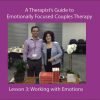How do you move forward after discovering that your partner has had an affair?
Many people ask themselves this question. They want to know if there is hope at the end of the tunnel, or if it is better to just call it quits.
The Difficult Road Ahead:
For those who choose to stay and work on their relationship it likely won’t be easy. The problems that were there to begin with are still there, but now on top of these you have to deal with broken trust and damage to the betrayed partner's sense of being special.
The Emotional Roller Coaster of Affair Recovery:
The betrayed partner is likely to go through frequent ups and downs.
The shock to their world and to their inherent sense of worth will leave them fearful of losing their partner in one moment, and angry and rejecting of their partner's love in the next moment.
They will typically be torn in many and sometimes opposite directions. In one moment they will remember how much they love their partner, and in another they will feel foolish for staying. Sadness will quickly be replaced with anger, and will often be mixed with feelings of shame, worthlessness, fear, and hurt.
This emotional roller coaster ride can be overwhelming and confusing both for the betrayed partner and for the person who had the affair.
However, no matter how difficult or unpleasant it can be on this emotional roller coaster, one thing is for sure, in order to successfully work through an affair, both partners need to be committed to going on the ride.
The Most Common Obstacle to Working through an Affair:
A frequent impasse I see as a couples therapist is that the person who has felt betrayed often needs to talk about their feelings often, whereas the person who had the affair wants to move past the feelings and focus on the future rather than the past.
This then can create a tug-of-war where every time the betrayed partner brings up their fears, anger, or sadness, feelings of guilt and shame are invoked in the person who had the affair. Mired in shame and guilt the person who had the affair can often find it difficult to stay empathic to what the betrayed partner is telling them since all they really hear is how bad they are. Wrapped up in their own negative spiral of self-blame and self-criticism the person who had the affair often finds this experience so unpleasant that they will do or say anything to make the conversation end.
Avoidance Behaviors of the Person who Engaged in the Affair:
To handle their own difficult feelings of shame, guilt, and fear of losing their partner, the person who engaged in the affair might:
- Skip over the betrayed person's emotions by focusing more on the solution (“Just tell me what you want me to do for you to feel more safe”, “Okay, I won’t go out with my friends any more if that makes you uncomfortable”)
- Placate their partner to avoid them getting upset (“Yes, I know I am wrong”, “I apologize for being inconsiderate”)
- Minimize their partner’s feelings (“I’ve said I’m sorry. Are you ever going to get over this?”)
- Shut down or withdraw (stop sharing their feelings and thoughts out of fear of their partner’s overreaction)
The Impact on the Betrayed Partner:
As a result of these coping mechanisms of the person who engaged in the affair, the betrayed partner might start to feel like their partner can’t really handle their feelings or that their feelings are only going to push their partner away.
They might therefore start to feel:
- Angry at themselves for not being able to get over the affair (“why can’t I just let it go”)
- Fearful that their partner will get fed up (my partner doesn’t want to hear it so I should try to deal with my feelings on my own)
- Overwhelmed with all their feelings and ready to explode at any moment
- Lonely, isolated, and not understood
The Development of a Culture of Silence:
Because of both partners own internal processes and reactions a culture of silence may begin to develop between them: The person who had the affair tries to tread lightly so as not to invoke their partner’s wrath or sadness, and the person who is dealing with the betrayal tries to spare their partner from all their “irrational” feelings which they know will push their partner away.
The Key to Helping Couples Overcome an Affair:
One of the most essential things when working with couples who have experienced an affair, is often to help them get out of the vicious cycle of how they are communicating or not communicating about the affair. Both partners often need help to talk about the affair successfully and the first step in accomplishing this is understand how it is that their current ways of communicating are getting them stuck.
How to Communicate Successfully about an Affair:
By reverse engineering the patterns that get couples stuck in their affair recovery process, we end up with the following recipe for successful communication:
The person who was betrayed must be helped to distill their complex rollercoaster of emotions into messages that can help their partner empathize with the hurt the affair has caused, without doing so in a way that pushes their partner into overwhelming guilt and shame.
Conversely, the person who had the affair must be helped to not get so overwhelmed by the guilt and shame that they can't stay present to their partner's feelings. Once they can remain present to their partner's pain, they must be helped to communicate their own sadness and regret.
Once the betrayed person feels their pain has been fully understood and empathized with, then, and only then, will an apology from the person who engaged in the affair feel sincere and be effective.
The Affair is an Invitation to Create a Better Relationship:
Once the more immediate emotional impact of the affair has been fully articulated and understood, both partners can then more fully open themselves up to an exploration of the things that were missing in the relationship before the affair. This will allow the affair to serve as a wake-up call to make changes in the relationship and address issues that were left unaddressed in the past.
As one couple realized, "I guess we stopped sharing the things that really matter with each other"
In most situations, affairs don’t happen out of the blue. They often happen when one partner decides to deal with emotional disconnection by turning outside the relationship instead of working things through with their partner.
In many cases this is the gift the affair might bring to a relationship. It allows both partners to look at how they have slowly drifted away from each other and may have pushed too many feelings under the rug.
These conversations about what was missing in the relationship do not excuse a person from having an affair, but provides more context for understanding why the affair happened, and helps both partners create a strong relationship to prevent that it would happen again.
Can You Recover from an Affair?
So to the simple question: Can you recover from an affair? The answer is: yes. But: it won’t be easy and it might require the help of a professional to make sure the couple doesn’t get stuck in one of the many vicious cycles that makes it impossible to communicate successfully about it. Once these roadblocks get removed, couples can rebuilt trust and learn valuable lessons that can make their relationship stronger.



























2 Responses